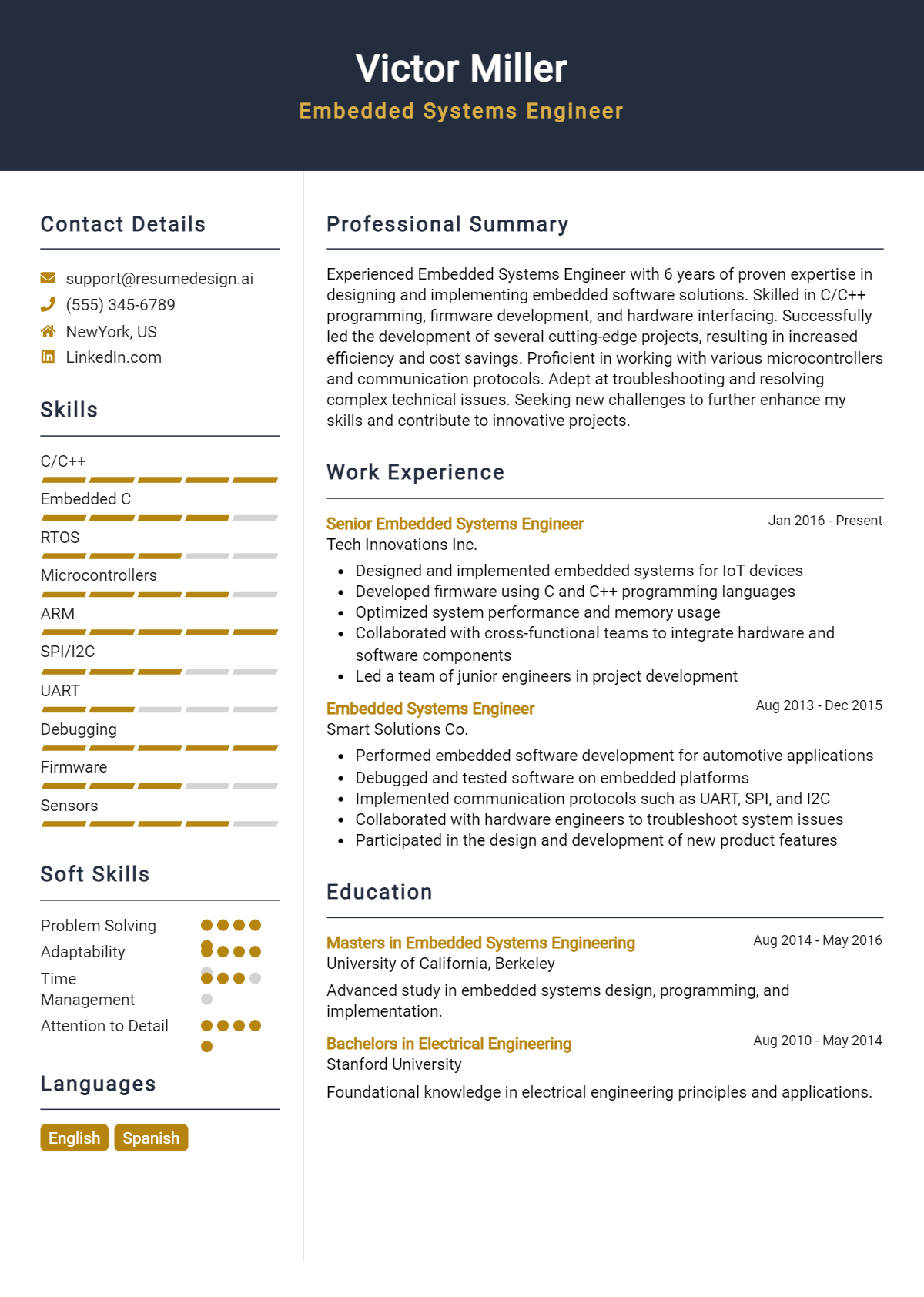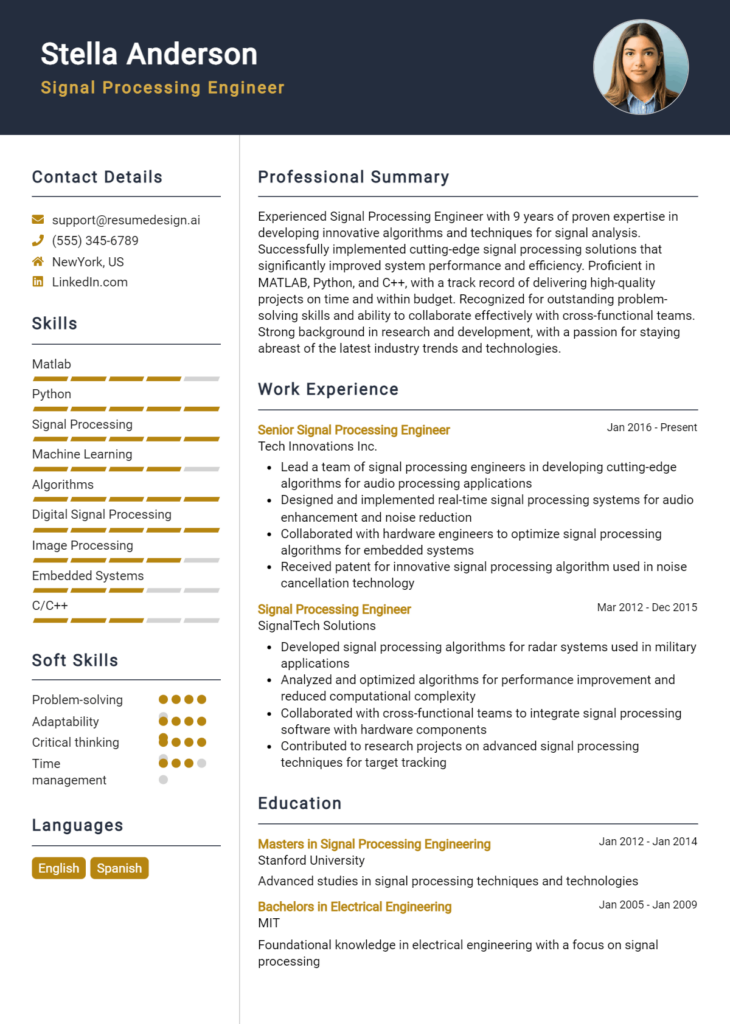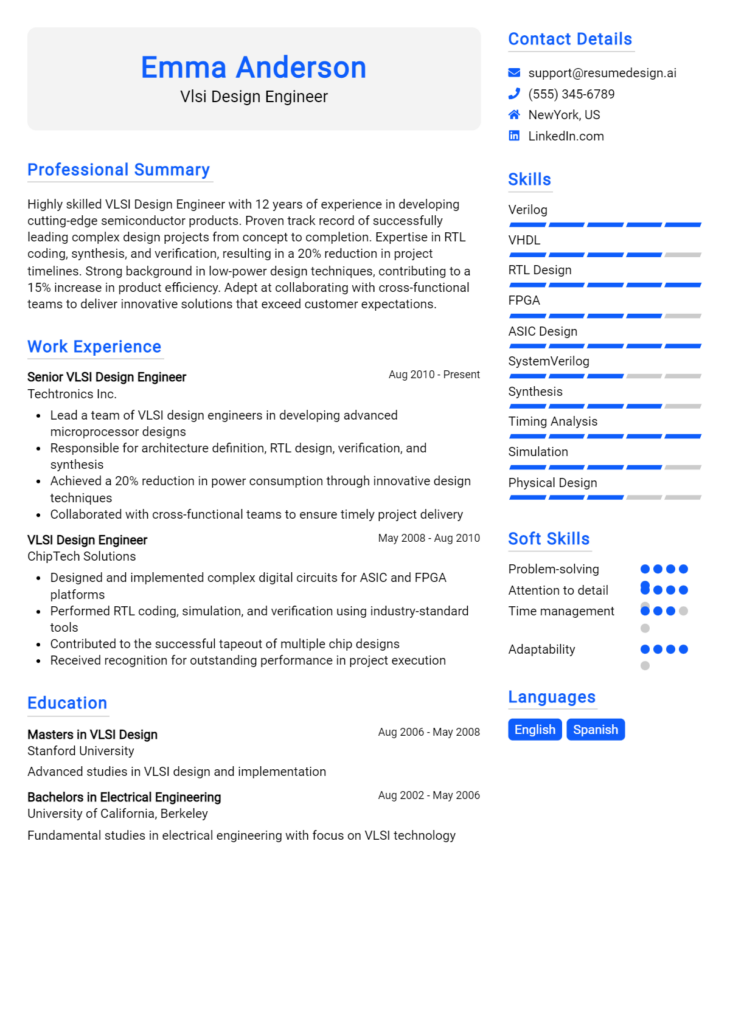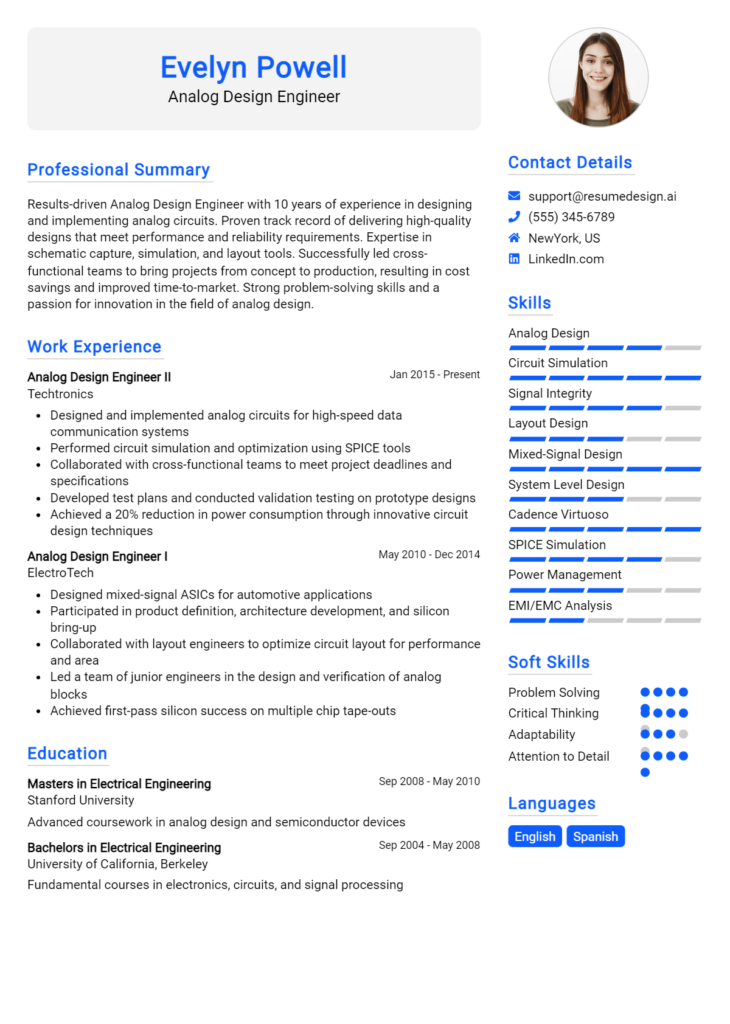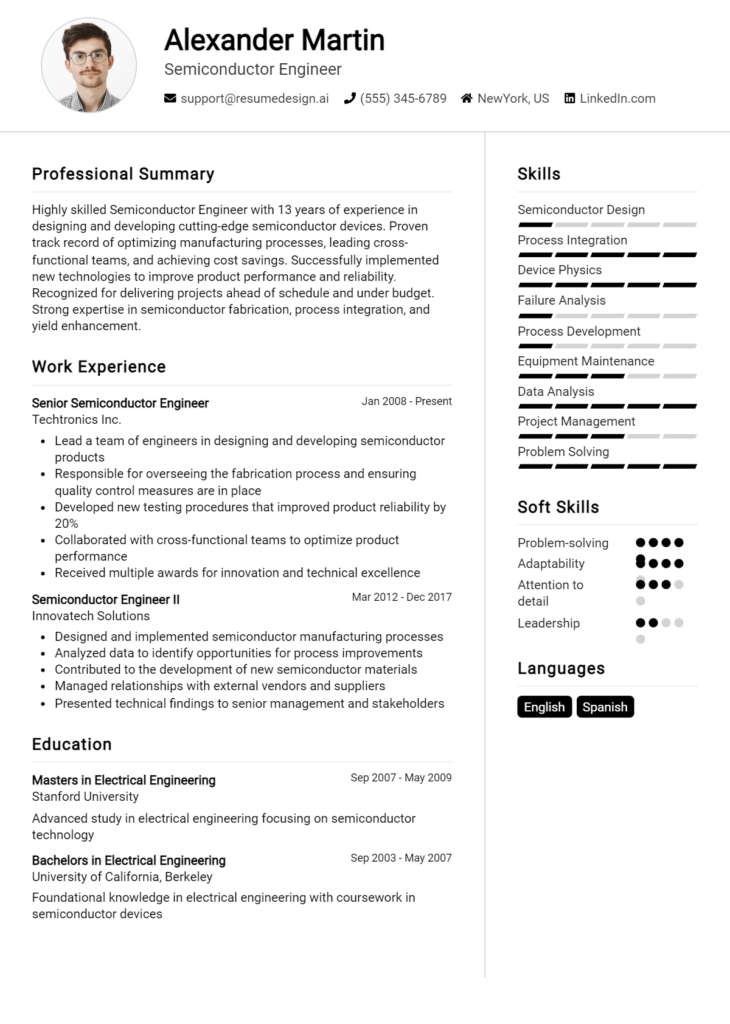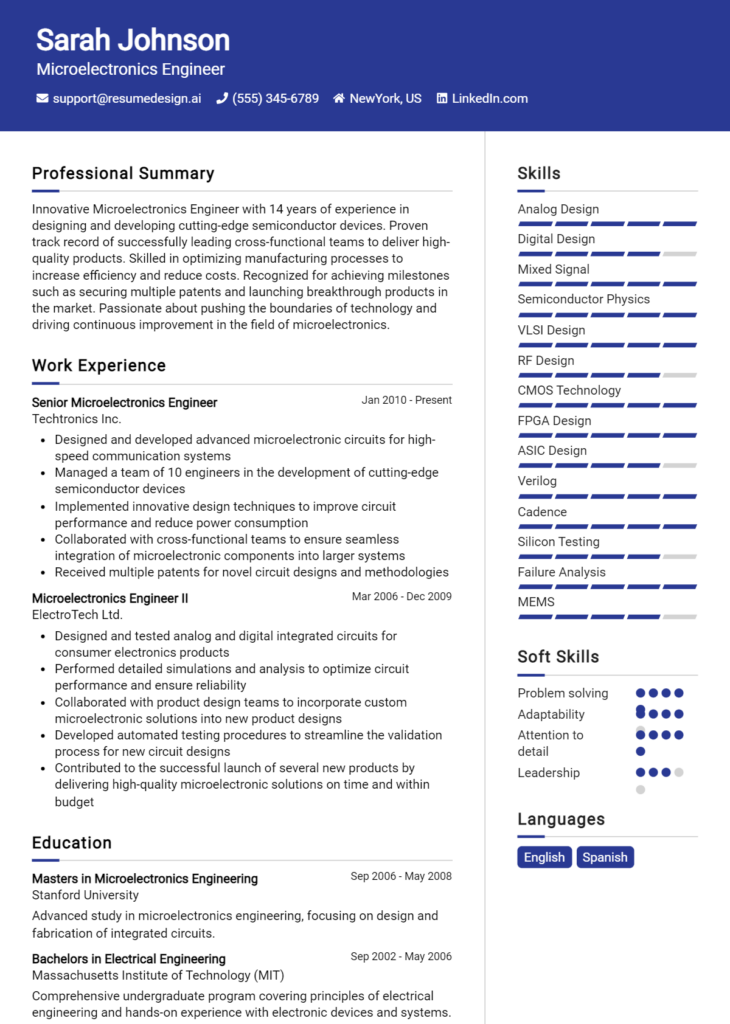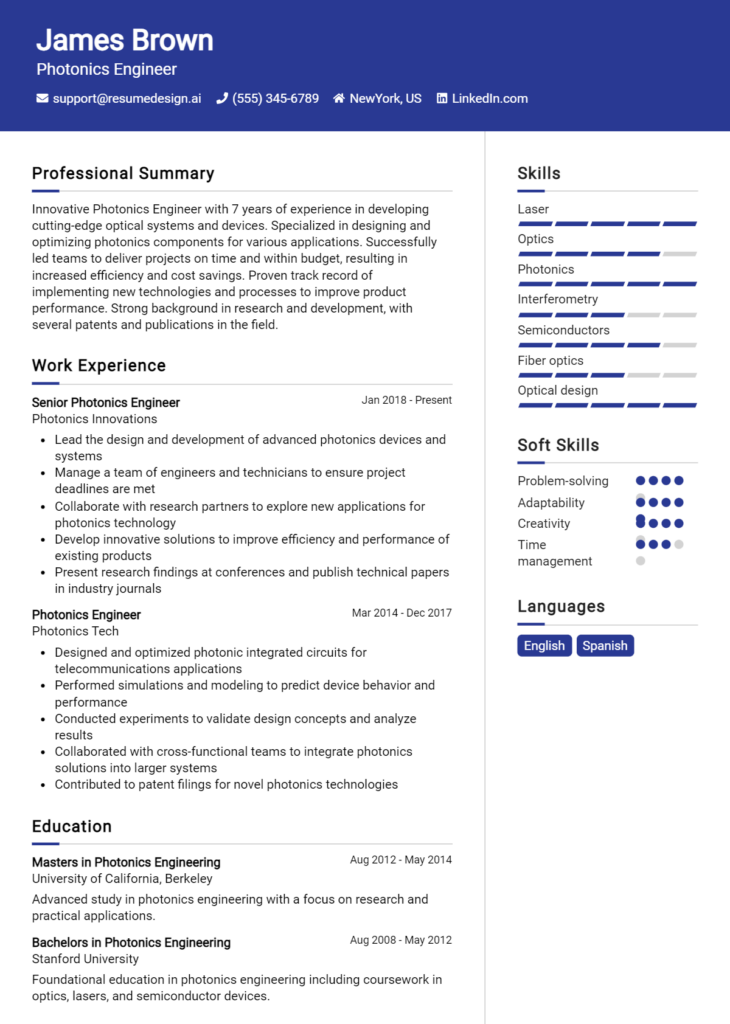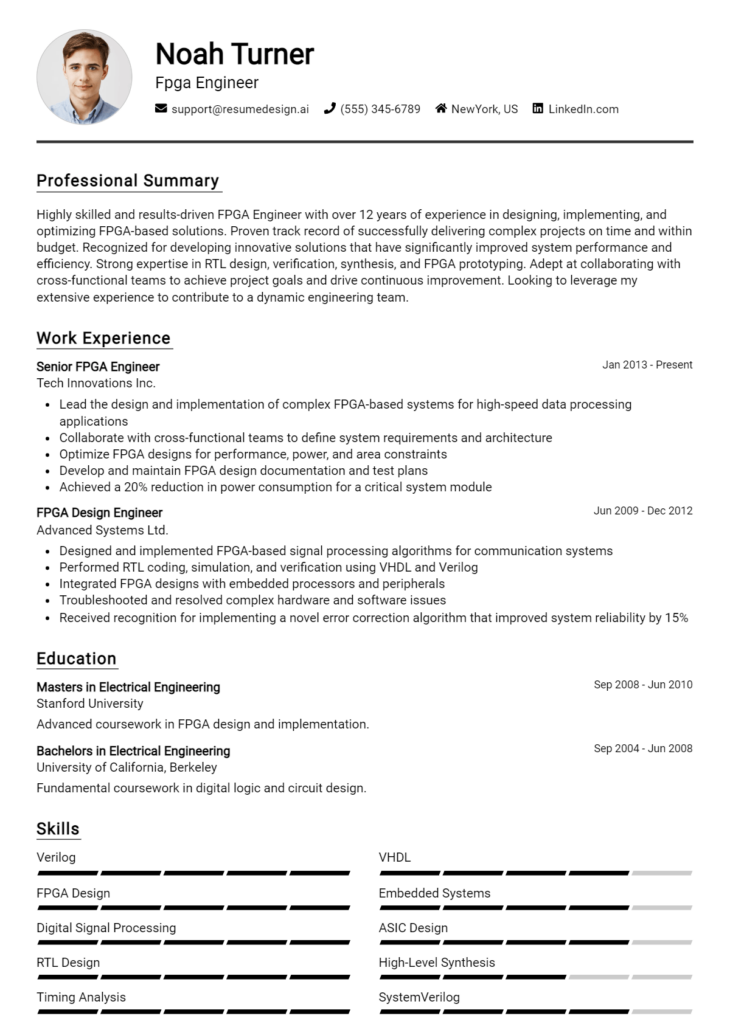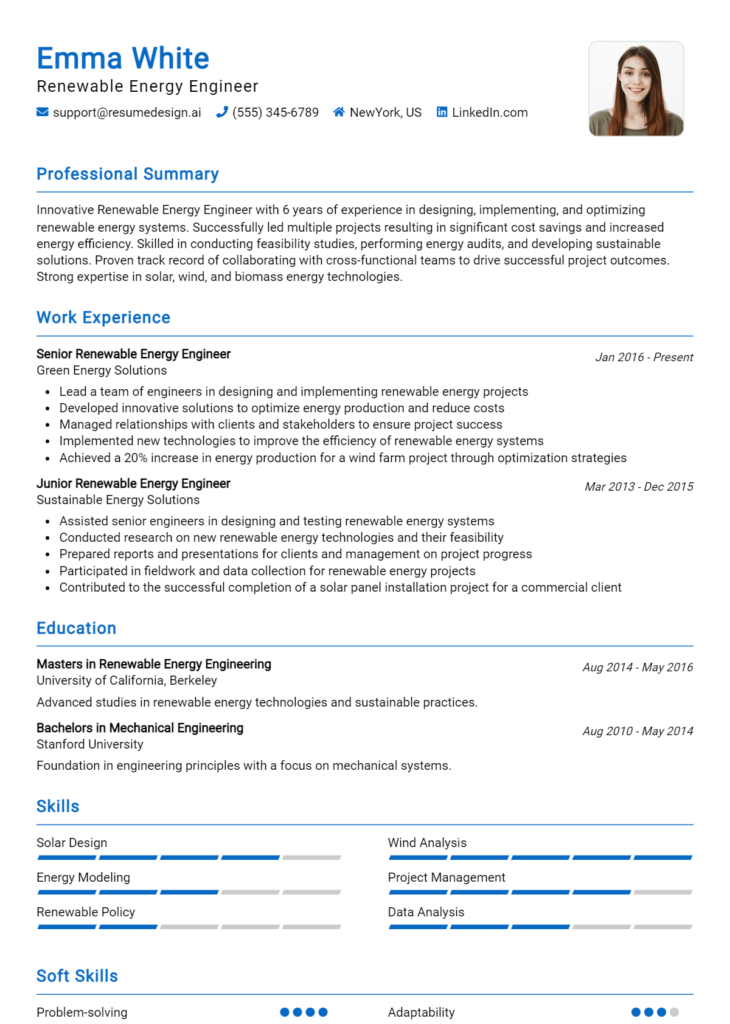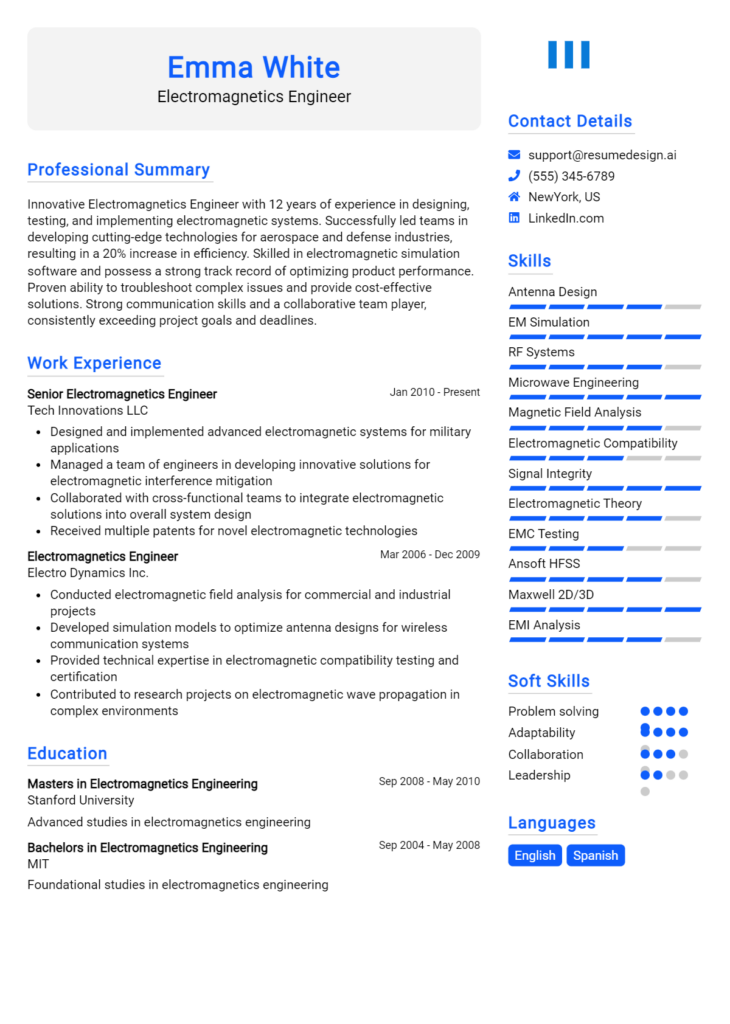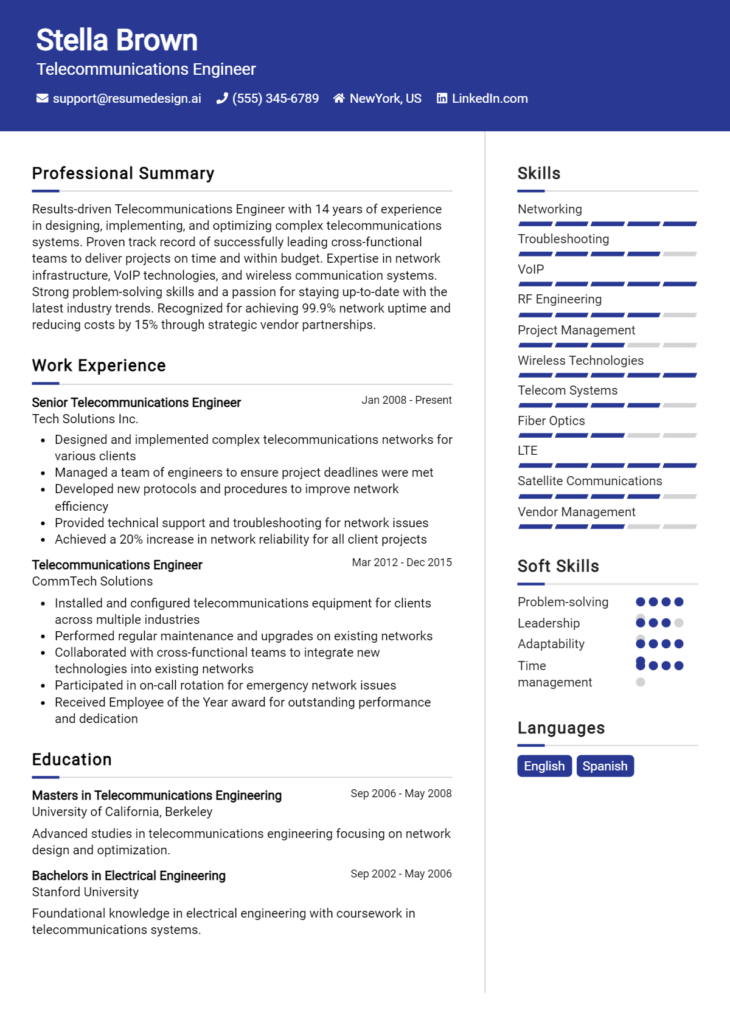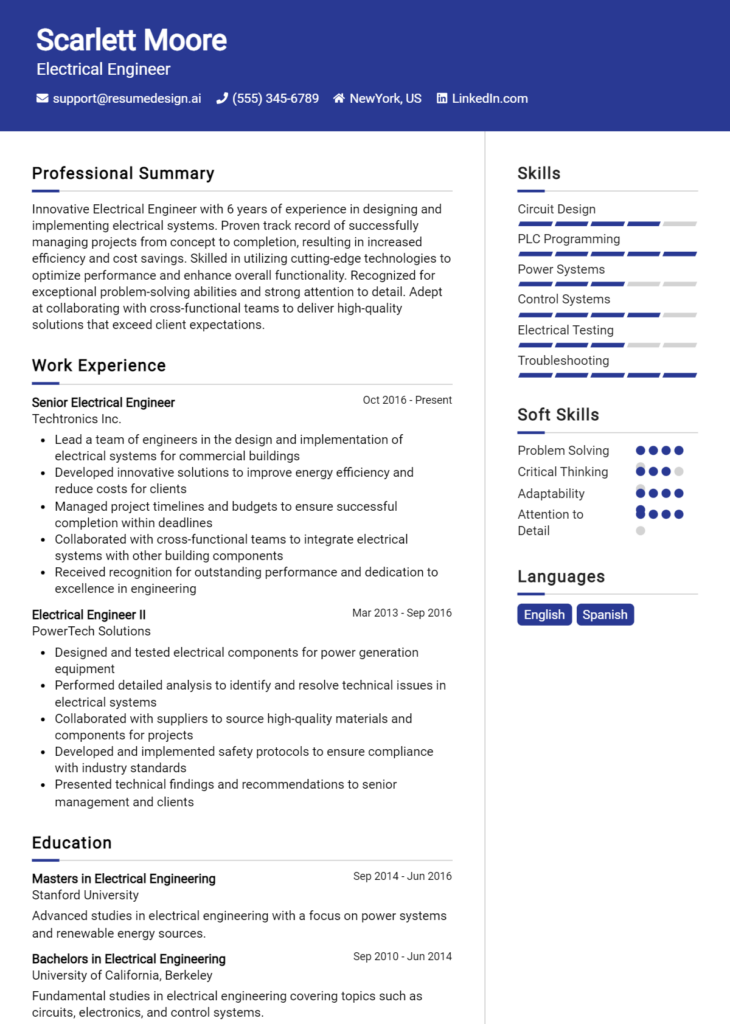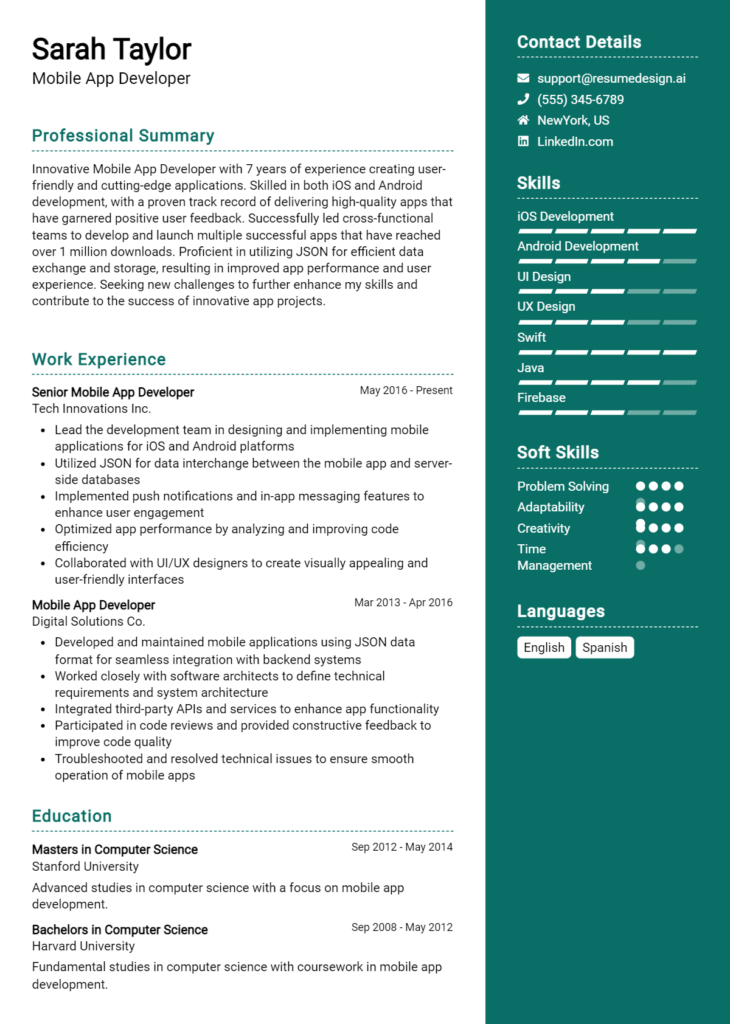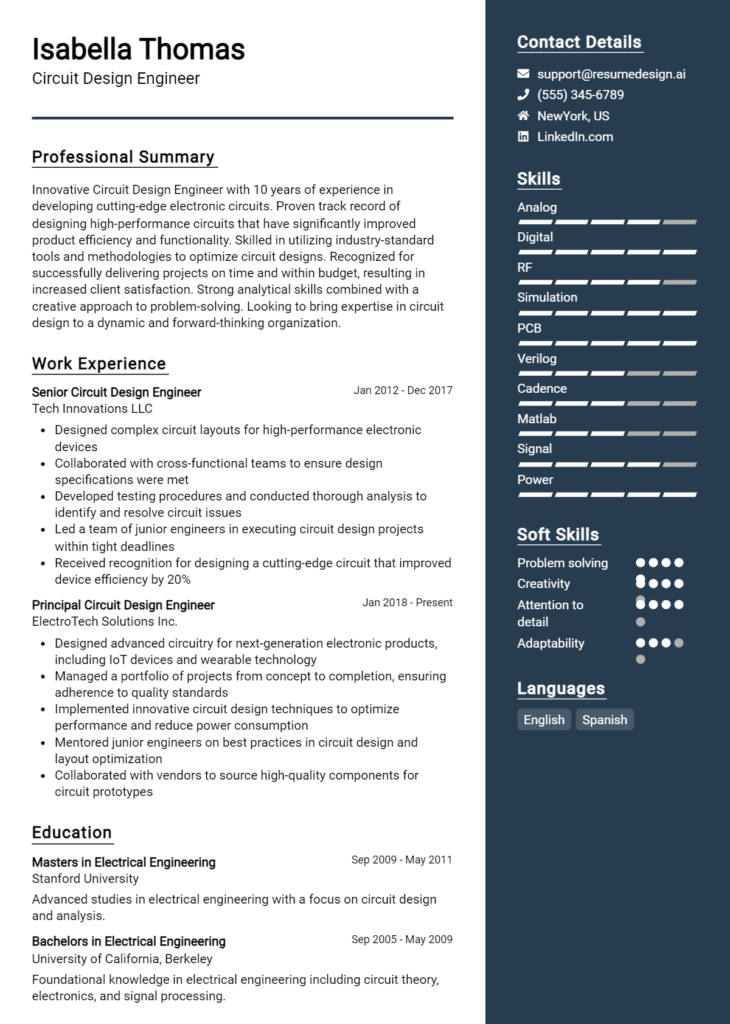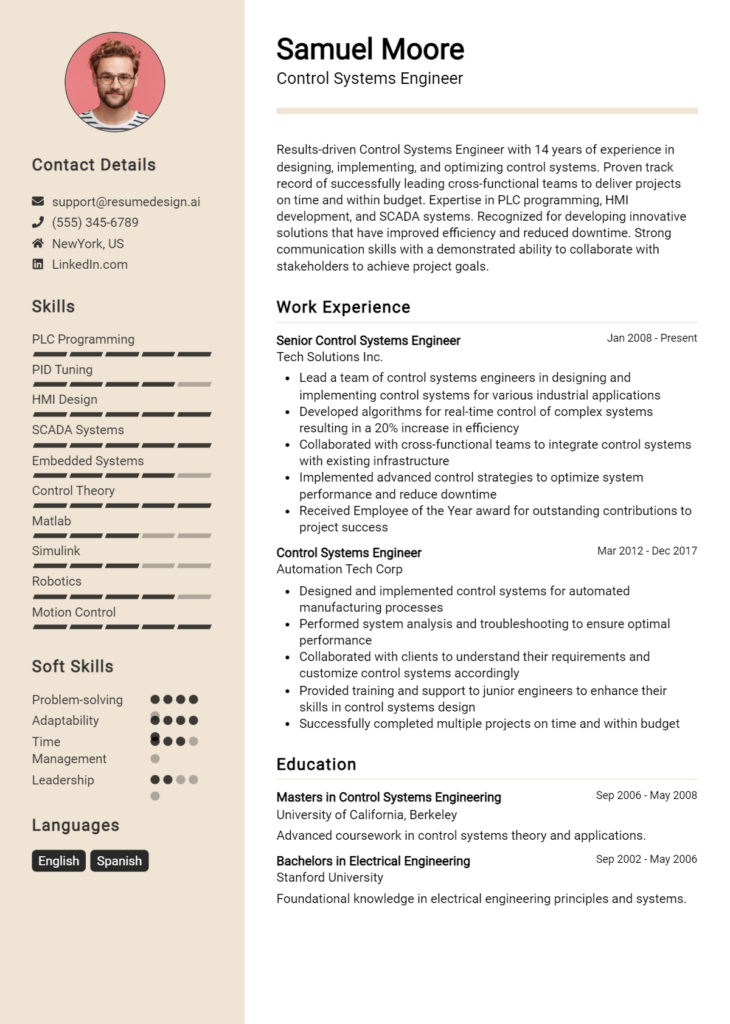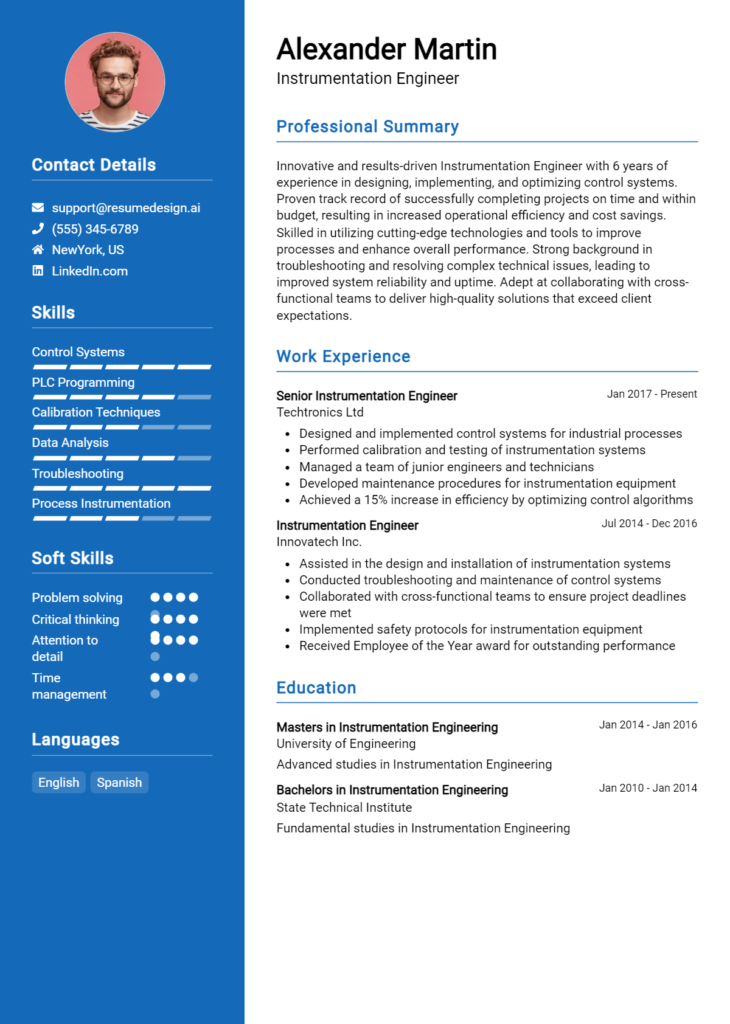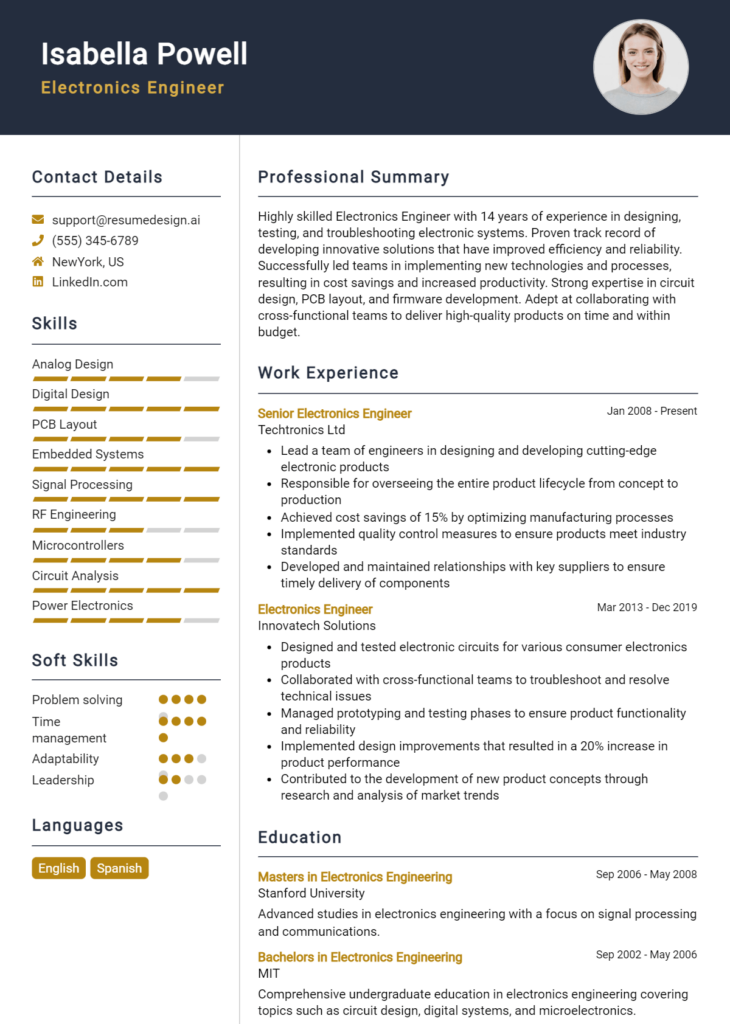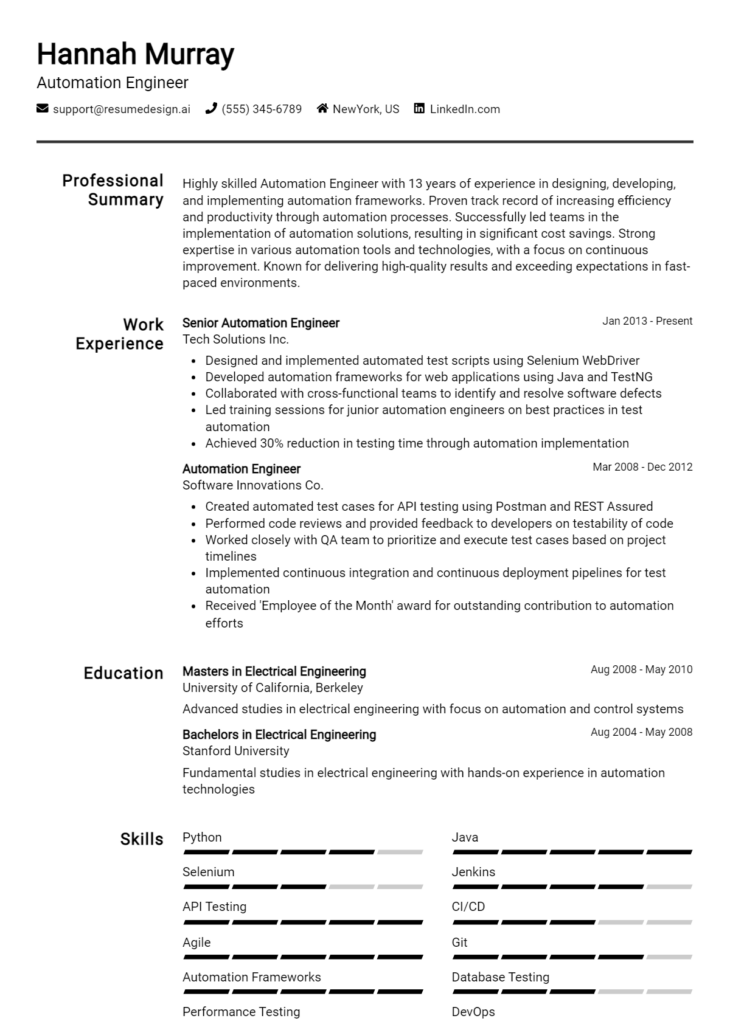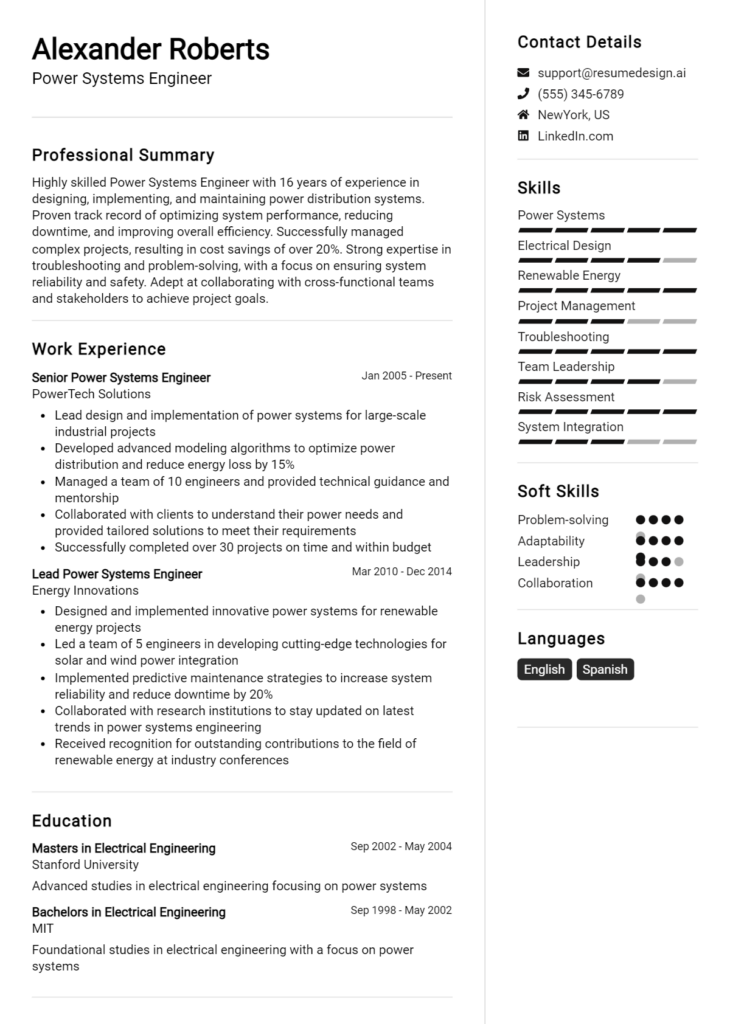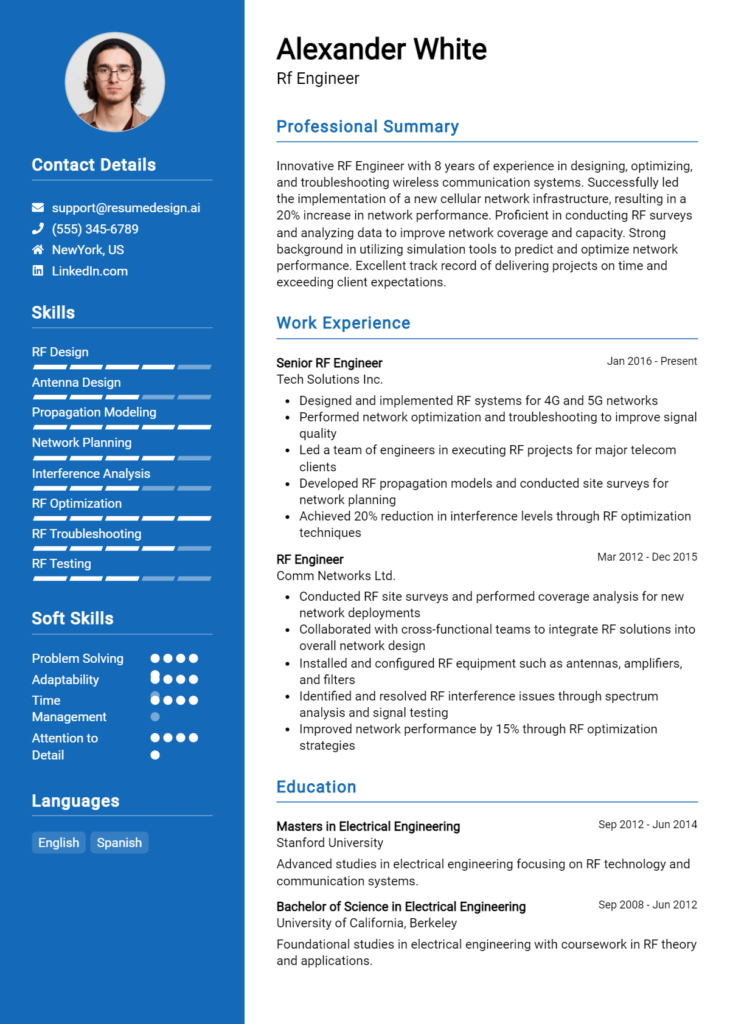Embedded Systems Engineer Core Responsibilities
An Embedded Systems Engineer plays a pivotal role in designing, developing, and testing embedded systems, ensuring seamless integration between hardware and software. This professional must possess strong technical skills in programming, circuit design, and systems architecture, along with excellent problem-solving abilities. By collaborating across departments—such as software development, hardware engineering, and quality assurance—an Embedded Systems Engineer contributes significantly to organizational goals. A well-structured resume that effectively showcases these skills can greatly enhance job prospects.
Common Responsibilities Listed on Embedded Systems Engineer Resume
- Design and implement embedded software for various applications.
- Develop and test firmware for microcontrollers and DSPs.
- Collaborate with hardware engineers to optimize system performance.
- Conduct debugging and troubleshooting of embedded systems.
- Analyze system requirements and specifications.
- Document design processes and maintain technical documentation.
- Utilize simulation tools for system performance analysis.
- Participate in code reviews and provide constructive feedback.
- Ensure compliance with industry standards and regulations.
- Implement and manage version control for software projects.
- Provide technical support and guidance to team members.
- Stay updated with emerging technologies and industry trends.
High-Level Resume Tips for Embedded Systems Engineer Professionals
A well-crafted resume is essential for Embedded Systems Engineer professionals, as it serves as the first impression that candidates make on potential employers. In a competitive job market, your resume must effectively showcase your skills, experience, and achievements in a way that aligns with the specific demands of the role. A strong resume not only highlights your technical expertise but also demonstrates your ability to solve complex problems and contribute to innovative projects. This guide will provide practical and actionable resume tips specifically tailored for Embedded Systems Engineer professionals, ensuring that you stand out to hiring managers and recruiters.
Top Resume Tips for Embedded Systems Engineer Professionals
- Tailor your resume to the job description by incorporating relevant keywords and phrases that align with the specific role you're applying for.
- Highlight your technical skills prominently, including programming languages (like C/C++), embedded software development, and hardware interfacing.
- Showcase your relevant experience by detailing past projects, including specific contributions, technologies used, and the impact of your work.
- Quantify achievements where possible, such as improving system efficiency by a percentage or reducing development time by specific hours.
- Include industry-specific certifications, such as those from IEEE or relevant vendor-specific training to demonstrate your commitment to continuous learning.
- Utilize a clean, organized format that enhances readability, using bullet points for responsibilities and achievements to make key information easy to find.
- Incorporate soft skills such as teamwork, communication, and problem-solving, which are crucial in collaborative engineering environments.
- Consider including a summary statement at the top of your resume that succinctly captures your experience and career goals.
- Keep your resume to one or two pages; be concise and focus on the most relevant information that showcases your qualifications.
By implementing these tips, you can significantly enhance your resume, making it more appealing to potential employers in the Embedded Systems Engineer field. A well-organized, tailored resume that effectively highlights your skills and achievements will increase your chances of landing interviews and ultimately securing the job you desire.
Why Resume Headlines & Titles are Important for Embedded Systems Engineer
In the competitive field of embedded systems engineering, a well-crafted resume headline or title is essential for standing out among a sea of applicants. These concise phrases serve as a quick summary of a candidate's key qualifications, allowing hiring managers to quickly gauge their fit for the role. A strong headline can grab attention immediately, showcasing relevant skills and experience in a way that resonates with the specific job being applied for. It should be impactful, relevant, and succinct, ensuring that it aligns directly with the requirements outlined in the job description.
Best Practices for Crafting Resume Headlines for Embedded Systems Engineer
- Keep it concise: Aim for one impactful phrase that captures your core strengths.
- Be role-specific: Tailor your headline to reflect the specific requirements of the embedded systems engineering position.
- Highlight key skills: Include critical technical skills or certifications relevant to embedded systems.
- Use industry terminology: Incorporate language that resonates with hiring managers in the embedded systems field.
- Avoid jargon: While technical terms are important, ensure that your headline is easily understandable.
- Showcase accomplishments: If possible, include a notable achievement that sets you apart.
- Stay professional: Maintain a formal tone that reflects your professionalism as an engineer.
- Review and revise: Continuously refine your headline to ensure it accurately reflects your current qualifications and the job you're targeting.
Example Resume Headlines for Embedded Systems Engineer
Strong Resume Headlines
Results-Driven Embedded Systems Engineer with 5+ Years in IoT Development
Innovative Embedded Systems Specialist Skilled in Firmware Development and Testing
Certified Embedded Systems Engineer with Expertise in Real-Time Operating Systems
Experienced Embedded Software Developer with Track Record of Successful Project Deliveries
Weak Resume Headlines
Engineer Looking for Opportunities
Embedded Systems Professional
Seeking a Job in Engineering
Strong headlines are effective because they convey specific qualifications and achievements that immediately resonate with hiring managers. By highlighting relevant skills and experiences, they create a compelling narrative that encourages further exploration of the resume. In contrast, weak headlines fail to impress because they lack specificity and do not communicate the candidate's unique value, making it difficult for hiring managers to understand what sets them apart from other applicants. A strong, targeted headline can be the key to making a positive first impression in a competitive job market.
Writing an Exceptional Embedded Systems Engineer Resume Summary
A well-crafted resume summary is a vital component for an Embedded Systems Engineer, as it serves as the first impression a hiring manager will have of a candidate. This brief yet impactful section quickly captures attention by succinctly showcasing key skills, relevant experience, and notable accomplishments that align with the job role. A strong summary distills the essence of the candidate's qualifications, making it clear why they are the ideal fit for the position. It should be concise, engaging, and tailored specifically to the job description, allowing the candidate to stand out in a competitive field.
Best Practices for Writing a Embedded Systems Engineer Resume Summary
- Quantify achievements: Use numbers to illustrate the impact of your contributions.
- Focus on relevant skills: Highlight technical and soft skills that align with the job requirements.
- Tailor the summary: Customize your summary for each application to reflect the specific job description.
- Keep it concise: Aim for 3-5 sentences to maintain clarity and brevity.
- Use action verbs: Start sentences with strong action verbs to convey confidence and proactivity.
- Highlight certifications: Mention relevant certifications or advanced degrees that bolster your qualifications.
- Showcase problem-solving abilities: Include examples of how you have resolved technical challenges in previous roles.
- Maintain a professional tone: Ensure the language used is formal and suits the engineering field.
Example Embedded Systems Engineer Resume Summaries
Strong Resume Summaries
Results-driven Embedded Systems Engineer with over 5 years of experience in developing and optimizing firmware for IoT devices, achieving a 30% increase in energy efficiency. Proficient in C/C++, Python, and embedded Linux, with a proven track record of delivering high-quality products under tight deadlines.
Innovative Embedded Systems Engineer with expertise in designing real-time operating systems and implementing automated testing protocols. Spearheaded a project that reduced development time by 25%, leading to significant cost savings for the company.
Dedicated Embedded Systems Engineer with a solid background in hardware-software integration, having successfully completed over 15 projects in automotive applications. Recognized for enhancing system performance by 40% through effective troubleshooting and optimization techniques.
Weak Resume Summaries
Embedded Systems Engineer with some experience in the field. I am looking for a new opportunity to grow my career.
Experienced engineer skilled in various technologies and software. Seeking a position where I can apply my knowledge.
The strong resume summaries are considered effective because they provide specific achievements and skills that clearly demonstrate the candidate’s qualifications and potential contributions to the employer. They quantify results, making a compelling case for their candidacy. In contrast, the weak resume summaries are vague and lack detail, failing to convey any measurable accomplishments or relevant skills, which diminishes their impact and effectiveness in capturing the hiring manager’s attention.
Work Experience Section for Embedded Systems Engineer Resume
The work experience section of an Embedded Systems Engineer resume is crucial as it serves as a platform to demonstrate the candidate's technical skills and their ability to manage teams effectively while delivering high-quality products. In this section, candidates can highlight their hands-on experience with embedded systems, showcase their problem-solving capabilities, and align their accomplishments with industry standards. By quantifying achievements and detailing specific contributions to projects, candidates can provide evidence of their expertise and impact in previous roles, making them more attractive to potential employers.
Best Practices for Embedded Systems Engineer Work Experience
- Use specific technical terminology relevant to embedded systems.
- Quantify achievements with measurable outcomes (e.g., reduced processing time by 30%).
- Highlight collaboration with cross-functional teams to showcase teamwork skills.
- Emphasize leadership roles in projects or teams to demonstrate management abilities.
- Include details on tools and technologies used to illustrate technical expertise.
- Align experiences with job descriptions to meet industry expectations.
- Focus on results-driven statements rather than general duties.
- Update the section regularly to reflect the most relevant and impactful experiences.
Example Work Experiences for Embedded Systems Engineer
Strong Experiences
- Led a team of 5 engineers in the development of a real-time embedded system that improved data processing speed by 40%, enhancing overall system efficiency.
- Designed and implemented a power management solution for IoT devices, achieving a 25% reduction in energy consumption, which contributed to sustainability goals.
- Collaborated with software engineers to integrate advanced debugging techniques, resulting in a 30% decrease in the average time to resolve issues during project development.
- Managed the complete lifecycle of an embedded system project from concept to deployment, delivering the final product 2 weeks ahead of schedule and under budget.
Weak Experiences
- Worked on embedded systems projects.
- Assisted in debugging issues on various systems.
- Participated in team meetings to discuss project updates.
- Contributed to the development of software solutions.
The examples listed as strong experiences are considered effective because they provide specific, quantifiable outcomes that highlight the candidate's technical leadership and collaborative efforts. Each statement emphasizes tangible results that align with the skills and responsibilities typically required of an Embedded Systems Engineer. Conversely, the weak experiences lack detail and measurable impact, making them less compelling to potential employers. They are vague and do not demonstrate the candidate's significant contributions or skills, which can lead to diminished interest from hiring managers.
Education and Certifications Section for Embedded Systems Engineer Resume
The education and certifications section of an Embedded Systems Engineer resume is crucial for showcasing a candidate's academic qualifications and professional development. This section not only reflects the foundational knowledge required for the role but also emphasizes any industry-relevant certifications and ongoing learning efforts. By providing details about relevant coursework, specialized training, and recognized certifications, candidates significantly enhance their credibility and demonstrate their commitment to staying current in the rapidly evolving field of embedded systems. This information can greatly influence hiring managers, showcasing the candidate's alignment with the technical demands of the position.
Best Practices for Embedded Systems Engineer Education and Certifications
- Include only relevant degrees that pertain to embedded systems, electronics, or computer engineering.
- List industry-recognized certifications, such as Certified Embedded Systems Engineer (CESE) or similar credentials.
- Highlight any specialized training related to embedded systems, real-time operating systems, or programming languages.
- Provide a concise list of relevant coursework that demonstrates specific knowledge and skills applicable to the role.
- Emphasize advanced degrees, such as a Master’s in Embedded Systems, to showcase higher-level expertise.
- Use clear formatting to make this section easy to read and scan for key information.
- Indicate the date of completion for certifications to show currency and relevance.
- Tailor the education and certification information to the specific job description to enhance alignment with employer expectations.
Example Education and Certifications for Embedded Systems Engineer
Strong Examples
- Bachelor of Science in Electrical Engineering, University of Technology, 2020
- Certified Embedded Systems Engineer (CESE), Issued by the Embedded Systems Certification Board, 2022
- Relevant Coursework: Microcontroller Programming, Real-Time Operating Systems, Digital Signal Processing
- Master of Science in Embedded Systems, Advanced University, 2023
Weak Examples
- Bachelor of Arts in English Literature, University of Arts, 2018
- Certification in Basic Computer Skills, Online Learning Platform, 2021
- Relevant Coursework: Introduction to Psychology, History of Art
- Diploma in Web Development, Community College, 2020
The examples listed as strong reflect qualifications and certifications that are directly relevant to the role of an Embedded Systems Engineer, demonstrating both technical knowledge and specialized training in the field. In contrast, the weak examples indicate educational qualifications and certifications that do not align with the requirements of the position, lacking relevance to embedded systems and failing to showcase the candidate's expertise in the necessary technical areas. This distinction underscores the importance of curating educational content that resonates with the job role.
Top Skills & Keywords for Embedded Systems Engineer Resume
As an Embedded Systems Engineer, the right combination of skills is essential for showcasing your expertise and making your resume stand out in a competitive job market. Employers look for candidates who not only possess the technical knowledge required to design and develop embedded systems but also demonstrate strong interpersonal and problem-solving abilities. Highlighting both hard and soft skills effectively can convey your capabilities and fit for the role, thus increasing your chances of landing an interview. To enhance your resume, it's crucial to include a well-rounded list of skills that reflect your qualifications and experiences in the field.
Top Hard & Soft Skills for Embedded Systems Engineer
Soft Skills
- Strong problem-solving abilities
- Effective communication skills
- Team collaboration and leadership
- Attention to detail
- Time management and organizational skills
- Adaptability and flexibility
- Critical thinking
- Creativity in design and troubleshooting
- Strong analytical skills
- Customer-focused mindset
Hard Skills
- Proficiency in programming languages (C, C++, Python)
- Experience with real-time operating systems (RTOS)
- Knowledge of embedded C programming
- Familiarity with microcontrollers and microprocessors
- Expertise in digital and analog circuit design
- Understanding of hardware-software integration
- Experience with debugging tools and methods
- Knowledge of communication protocols (I2C, SPI, UART)
- Familiarity with embedded software development tools (IDE, compilers)
- Experience in system-level design and architecture
By incorporating these skills into your resume, you can effectively demonstrate your qualifications as an Embedded Systems Engineer. Additionally, don't forget to detail your work experience to give potential employers a comprehensive view of your capabilities and contributions in previous roles.
Stand Out with a Winning Embedded Systems Engineer Cover Letter
Dear [Hiring Manager's Name],
I am writing to express my interest in the Embedded Systems Engineer position at [Company Name], as advertised on [where you found the job listing]. With a strong background in embedded systems design, software development, and hardware integration, I am excited about the opportunity to contribute to your innovative projects. My hands-on experience with microcontrollers, real-time operating systems, and communication protocols, combined with my passion for developing efficient and reliable embedded solutions, makes me a strong candidate for this role.
In my previous position at [Previous Company Name], I successfully led a team to develop a cutting-edge IoT device that enhanced user experience through seamless connectivity and advanced functionality. This involved not only designing and implementing firmware but also collaborating with cross-functional teams to ensure a smooth integration of hardware and software components. My proficiency in C/C++, Python, and embedded Linux has enabled me to optimize system performance and troubleshoot complex issues effectively. I am particularly proud of a project where I reduced power consumption by 30%, which significantly improved the product's battery life and user satisfaction.
I am also committed to continuous learning and staying updated with the latest industry trends and technologies. I have participated in several professional development workshops and have a keen interest in exploring emerging areas such as machine learning in embedded systems. I am confident that my proactive approach and eagerness to innovate align well with [Company Name]'s mission to push the boundaries of technology.
Thank you for considering my application. I look forward to the opportunity to discuss how my skills and experiences align with the needs of your team. I am excited about the prospect of contributing to [Company Name] and helping to deliver high-quality embedded solutions that meet the demands of your clients.
Sincerely,
[Your Name]
[Your LinkedIn Profile]
[Your Contact Information]
Common Mistakes to Avoid in a Embedded Systems Engineer Resume
When crafting a resume for the position of an Embedded Systems Engineer, it’s crucial to present your skills and experiences in a way that clearly demonstrates your qualifications. However, many candidates make common mistakes that can detract from their potential. Avoiding these pitfalls can significantly enhance your chances of landing an interview. Here are some key mistakes to steer clear of:
Vague Job Descriptions: Failing to provide specific details about previous roles can leave hiring managers unsure of your actual responsibilities and achievements. Use quantifiable metrics where possible.
Overloading Technical Jargon: While it's important to demonstrate technical expertise, overusing jargon can alienate non-technical recruiters. Strive for clarity and balance.
Ignoring Relevant Skills: Not tailoring your resume to highlight skills specific to embedded systems, such as RTOS, C/C++, or hardware interfacing, may cause your application to be overlooked.
Inconsistent Formatting: A messy or inconsistent layout can distract from your content. Use uniform fonts, bullet points, and sections to create a clean and professional appearance.
Not Showcasing Projects: Failing to mention relevant projects, especially hands-on or personal ones, can miss an opportunity to demonstrate your practical skills and passion for embedded systems.
Neglecting Soft Skills: Technical skills are vital, but not highlighting soft skills like teamwork, communication, and problem-solving can create an incomplete picture of your capabilities.
Using an Unprofessional Email Address: An informal or whimsical email address can come across as unprofessional. Opt for a simple, professional email format.
Lengthy Resumes: A resume that exceeds two pages can overwhelm recruiters. Aim for conciseness, focusing on the most relevant experiences and skills that pertain to the position.
Conclusion
As an Embedded Systems Engineer, your expertise in designing and implementing software and hardware solutions is crucial in today's technology-driven world. Throughout this article, we have explored the essential skills required for success in this role, including proficiency in programming languages like C and C++, an understanding of microcontrollers, and experience with real-time operating systems. Additionally, we discussed the importance of troubleshooting and debugging skills, as well as the ability to work collaboratively in cross-functional teams.
To ensure you stand out in the competitive job market, it's vital to present a polished and professional resume that highlights your unique qualifications and experiences. We encourage you to take a moment to review and update your Embedded Systems Engineer resume.
Utilize available resources like resume templates, which can provide a solid foundation for your document. If you're looking for a more tailored approach, consider using our resume builder to create a customized resume that reflects your skills and achievements. Explore resume examples for inspiration on how to effectively showcase your experience, and don't forget to complement your resume with a compelling cover letter using our cover letter templates.
Take action today to enhance your resume and increase your chances of landing your dream job as an Embedded Systems Engineer!

